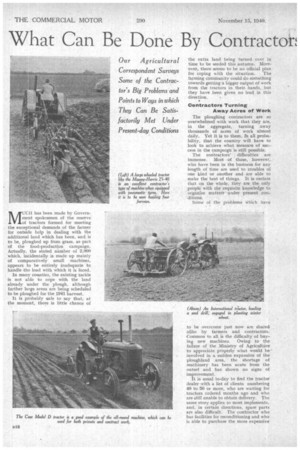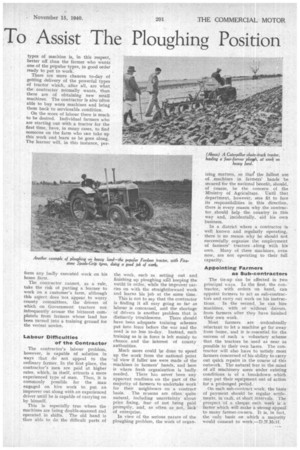What Can Be Done By Contractor To Assist The Ploughing Position
Page 24

Page 25

If you've noticed an error in this article please click here to report it so we can fix it.
MUCH has been made by Government spokesmen of the reserve of tractors formed for meeting the exceptional demands of the farmer for outside help in dealing with the additional land which has been, and is to be, ploughed up from grass, as part of the food-production campaign. Actually, the stated number of 2,000 which, incidentally is made up mainly of comparatively small machines, appears to be entirely inadequate to handle the load with which it is faced.
In many counties, the existing tackle is not able to cope with the land already under the plough, although further large areas are being scheduled to be ploughed for the 1941 harvest.
It is probably safe to say that, at the moment, there is little chance of the extra land being turned over in time 'to be seeded this autumn. Moreover, there seems to be no official plan for coping with the situation. The farming community could do something towards getting a bigger output of work from the tractors in their.. hands, hut they have been given no lead in this direction.
Contractors Turning Away Acres of Work
The ploughing contractors are so overwhelmed with work that they are, in the aggregate, turning .away thousands of acres of work almost daily. Yet it is to them, rn. all.probability, that the country will have to look to achieve what measure of success in the campaign is still possible.
The contractors' -difficulties are immense. Most of those, however, who have been in the business for any length of time are used to troubles of one kind or another and are able to make the best of things. It is certain that on the whole, they are the only people with the requisite knowledge to organise matters under present conditions.
Some of the problems which have
to be overcome just now are shared alike by farmers and contractors. Common to all is the difficulty of buying new machines. Owing to the failure of the .Ministry of AgricuItUre to appreciate properly what would be 'involved in a sudden expansion of the ploughland area, the shortage of machinery has been acute from the outset and has shown no signs of improvement.
It is usual to-day to find the tractor dealer with a list of clients numbering 40 to 50 or more, who are waiting for tractors ordered months ago and who are still unable to obtain delivery. The same story applies to most implements, and, in certain directions, spare parts are also difficult. The contractor who has facilities for reconditioning and who is able to purchase the more expensive types of machine is, in this respect, better off than the farmer who wants one of the popular types, in good order ready to put to work.
There are more chances to-day of getting delivery of the powerful types of tractor which, after all, are what the contractor normally wants, than there are of obtaining new small machines. The contractor is also often able to buy worn machines and bring them back to serviceable condition.
On the score of labour there is much to be desired. Individual farmers who are starting out with a tractor for the first time, have, in many cases, to find someone on the farm who can take up this work and learn as he goes along. The learner will, in this instance, per
form any badly executed work on his home farm.
The contractor cannot, as a rule, take the risk of putting a learner to work on a customer's farm, although this aspect does not appear to worry county committees, the drivers of which on Government tractors not infrequently arouse the bitterest complaints from farmers whose land has been turned into a training ground for the veriest novice.
Labour Difficulties of the Contractor
The contractor's labour problem, however, is capable of solution in ways that do. not appeal to the ordinary farmer. In the first place, the contractor's men are paid at higher rates, which, in itself, attracts a more experienced type of man. Then, it is commonly possible for the man engaged on hire work to put an improver out along with an experienced driver until he is capable of carrying on by himself.
This is especially true where the machines are being double-manned and operated in shifts. The old hand is then able to do the difficult parts of the work, such as setting out and finishing up ploughing and keeping the outfit in order, while the improver carries on with the straightforward work and learns his job at the same time.
This is not to say that the contractor is finding it all easy going so far as labour is concerned, and the shortage of drivers is another problem that is distinctly troublesome. There should have been adequate training schemes put into force before the war and the need is no less to-day. Instead, such training as is in force is left mainly to chance and the interest of county authorities.
Much more could he done to speed up the work from the national point -of view if fuller use were made of the machines in farmers' hands, and here is where fresh organization is badly needed. There has never been any apparent readiness on the part of the majority of farmers to undertake work for their -neighbours on a contract basis. The reasons are often quite natural, including uncertainty about price fixing, fear of not being paid promptly, and, as often as not, lack of enterprise.
In view of the serious nature of the ploughing problem, the work of organ
izing matters, so that' the fullest use of .machines in farmers' hands be secured for the national benefit, should, of Course, be the concern of the Ministry of Agriculture. Until that department, however, sees fit to face its responsibilities in this direction, there is every reason why the contractor should help the country in this way and, incidentally, aid his own business.
In a district where a contractor is well known and regularly operating, there is no reason why he should not successfully organize the employment of farmers' tractors along with his own. Many of these machines, even now, are not operating to their full capacity.
Appointing Farmers as Sub-contractors The tie-up can be effected in two principal ways. In the first, the contractor, with orders on hand, can appoint farmers to act as sub-contractors and carry out work on his instructions. In the second, he can hire machines, with or without drivers, from farmers after they have finished their own work.
Most farmers are undoubtedly reluctant to let a machine go far away from home,. and it is -essential for the success of such a voluntary scheme that the tractors be used as near as possible to their own bases. The contractor will also have to satisfy most farmers concerned of his ability to carry out quick repairs in the course of this outwork. The natural fear in the mind of all machinery users under existing conditions is of a breakdown which may put their equipment out of action for a prolonged period.
On such sub-contract work, the basis of payment should be regular settle-. ments, in"cash, at short intervals. The prospect of a cheque each week is a factor which will make a strong appeah to many farmer-owners. It is, in fact, the only basis on which a majority would consent to work.-1).N.McIf.




























































